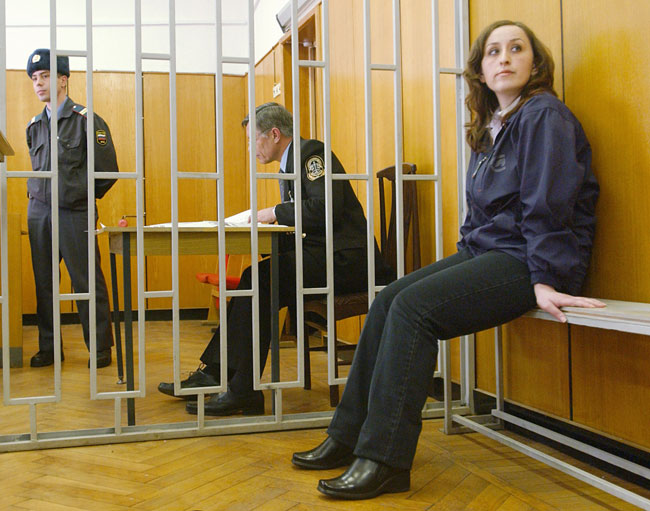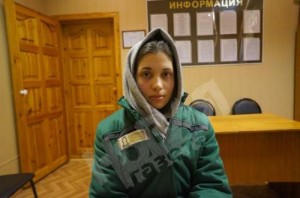Zara Murtazalieva, a 30-year-Chechen woman who spent almost all her adult life in a Siberian penal colony until her release last year, has spoken about her experiences, reports Russian-language news site Kavkazskii Uzel, which focusses on the North Caucasus.
In 2005, Murtazalieva was sentenced to eight years in the IK-13 Potma women’s penal colony in Mordovia, after being found guilty in a brief trial of plotting a terrorist attack in Moscow’s Okhotnyi Ryad shopping mall.
Human rights groups said that Murtazalieva was framed, and that the explosives had been planted in her bag after she had been placed under surveillance by a member of the Special Forces against Organized Crime of the the Municipal Department of Internal Affairs of Moscow (УБОП ГУВД), a man named. Said Ahmaev.
The young woman had travelled to Moscow from Chechnya in September 2003, and worked there as an insurance agent, supporting her widowed mother’s family back home. In early 2004, Ahmaev made her acquaintance and said he would help look after her. On March 4, 2004, Murtazalieva was detained in Moscow and taken for questioning. As she was about to leave, police searched her bag and found two explosives.
Murtazalieva was released in September.
Kavkazskii Uzel describes Murtazalieva’s meeting this month at Hamburg’s Rote Flora building.
“Shortly before arriving in Hamburg, I spent some time in Berlin. On one of the excursions to the former concentration camps there was an exhibition stand, where they displayed the stripes that were on people’s clothing depending on their nationalities, religion, political belief. Those who showed it to me thought it may be a revelation to me. But, you know, the colonies in Russia still have this system. Yes, stripes of different colors. And this is not the twentieth century and the Second World War, it is happening here and now, in Russia in the 21st century.”
She explained that in the women’s prison where she served her sentence, all convicts had stripes on their chest, which represented the crime they had committed, suicidal tendencies, escape.
Murtazalieva went on to describe some of the conditions in the penal colony:
“(There were) daily beatings, all kinds of torture, we worked 15 hours a day with no vacations. We sewed clothes, and for this hard work we were given 200-300 rubles a month, which was enough to buy a kilogram of sweets and a pound of cookies. The disease from which most prisoners suffered was supposedly heart failure. But actually people die from beatings and torture.”
Murtazalieva said that around 30% of inmates in Russia’s prison colonies say they are innocent.
Round Table In Moscow Will Provide Forum For Former Prisoners To Speak Out
The former penal colony inmate said that in the near future, there will be a “round table” in Moscow to discuss the situation in Russian women’s prisons.
“One of the organizers of the event is a journalist, the writer Zoya Svetova. The round table in Moscow will bring together former prisoners of three female colonies in Mordovia. These women will tell their story, what they have suffered, and what is actually happening.”
The event will support an open letter written by Nadezhda Tolokonnikova, the political activist and singer from punk rock band Pussy Riot, who was convicted in of “hooliganism motivated by religious hatred” for a performance in Moscow’s Cathedral of Christ the Savior, and sentenced to two years’ imprisonment in the IK-17 women’s penal colony in Mordovia. She is currently in the IK-50 penal colony in Siberia, but wrote her open letter from Prison Colony 14, where Murtalazieva was held for a time. The open letter described the incredibly harsh conditions in the camp, including 15 hour work days and beatings.
The letter was given to Russian news agency Interfax at the end of September by Tolokonnikova’s partner. In response, the chairman of the Public Oversight Commission of the Republic of Mordovia Gennady Morozov told RIA Novosti that there was no truth in Tolokonnikova’s words. “This has never happened. The colonies are regularly checked by prosecutors, and central board of the Federal Penitentiary Service, and human rights activists. There have never been any similar complaints,” Morozov was quoted as saying.
Murtazaliyeva said that the round table in Moscow would support Tolokonnikova and let people know that “no one thought that it’s all invented and that what she wrote was just a bit of a lark. Everything she described is a harsh reality.”
There have already been reports that Tolokonnikova’s open letter from Penal Colony 14 has led to some improvements in the penal colony the singer was in at the time, the former inmate said.
“Recently (October 30) a girl was released from that colony, who told us that after the open letter from Tolokonnikova the working day was reduced to 8 hours and (inmates) have been given two days off, and are better fed. But you know, it is unclear how long it will last. The worst thing is that there is no high-profile cases, nobody is paying attention. The voices of ordinary prisoners cannot be heard…”
Tolokonnikova’s Open Letter
The text of Pussy Riot singer Tolokonnikova’s open letter www.theguardian.com/music/2013/sep/23/pussy-riot-hunger-strike-nadezhda-tolokonnikova” target=”_blank”>can be read here, an extract is below.
Beginning Monday, 23 September, I am going on hunger strike. This is an extreme method, but I am convinced that it is my only way out of my current situation.
The penal colony administration refuses to hear me. But I, in turn, refuse to back down from my demands. I will not remain silent, resigned to watch as my fellow prisoners collapse under the strain of slavery-like conditions. I demand that the colony administration respect human rights; I demand that the Mordovia camp function in accordance with the law. I demand that we be treated like human beings, not slaves.
It has been a year since I arrived at Penal Colony No 14 in the Mordovian village of Parts. As the prisoner saying goes: “Those who never did time in Mordovia never did time at all.” I started hearing about Mordovian prison colonies while I was still being held at Pre-Trial Detention Centre No 6 in Moscow. They have the highest levels of security, the longest workdays, and the most flagrant rights violation. When they send you off to Mordovia, it is as though you’re headed to the scaffold. Until the very last moment, they keep hoping: “Perhaps they won’t send you to Mordovia after all? Maybe it will blow over?” Nothing blew over, and in the autumn of 2012, I arrived at the camp on the banks of the Partsa River.
Mordovia greeted me with the words of the deputy chief of the penal colony, Lieutenant Colonel Kupriyanov, who is the de facto head administrator of our colony. “You should know that when it comes to politics, I am a Stalinist.” Colonel Kulagin, the other head administrator — the colony is run in tandem — called me in for a conversation on my first day here with the objective to force me to confess my guilt. “A misfortune has befallen you. Isn’t that so? You’ve been sentenced to two years in the colony. People usually change their minds when bad things happen to them. If you want to be paroled as soon as possible, you have to confess your guilt. If you don’t, you won’t get parole.” I told him right away that I would only work the 8 hours a day required by the labour code. “The code is one thing — what really matters is fulfilling your quota. If you don’t, you work overtime. You should know that we have broken stronger wills than yours!” was Kulagin’s response.
My brigade in the sewing shop works 16 to 17 hours a day. From 7.30am to 12.30am. At best, we get four hours of sleep a night. We have a day off once every month and a half. We work almost every Sunday. Prisoners submit petitions to work on weekends “out of [their] own desire”. In actuality, there is, of course, no desire to speak of. These petitions are written on the orders of the administration and under pressure from the prisoners that help enforce it.
No one dares to disobey these orders and not submit such petitions regarding entering the work zone on Sunday, which means working until 1 am. Once, a 50-year-old woman asked to go back to the residential zone at 8pm instead of 12.30am so she could go to bed at 10 pm and get eight hours of sleep just once a week. She was feeling ill; she had high blood pressure. In response, they held a unit meeting in order to take the woman down, insult and humiliate her, branding her a parasite. “What, do you think you’re the only one who wants more sleep? You need to work harder, you cow!” When someone from the brigade doesn’t come to work on doctor’s orders, they’re bullied as well. “I worked when I had a fever of 40C and it was fine. What are you thinking — who is going to pick up the slack for you?”


